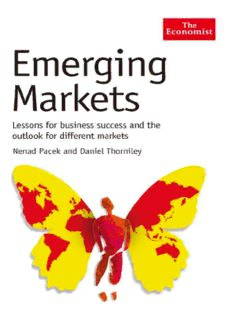
Emerging Markets: Lessons for Business Success and the Outlook for Different Markets PDF
Preview Emerging Markets: Lessons for Business Success and the Outlook for Different Markets
EMERGING MARKETS OTHER ECONOMIST BOOKS Guide to Analysing Companies Guide to Business Modelling Guide to Business Planning Guide to Economic Indicators Guide to the European Union Guide to Financial Markets Guide to Management Ideas Numbers Guide Style Guide Dictionary of Business Dictionary of Economics International Dictionary of Finance Brands and Branding Business Ethics Business Strategy China’s Stockmarket E-trends Globalisation Successful Innovation Successful Mergers Wall Street Essential Director Essential Economics Essential Finance Essential Internet Essential Investment Essential Negotiation Pocket Asia Pocket Europe in Figures Pocket World in Figures EMERGING MARKETS Lessons for business success and the outlook for different markets Nenad Pacek and Daniel Thorniley THE ECONOMIST IN ASSOCIATION WITH PROFILE BOOKS LTD Published by Profile Books Ltd 58A Hatton Garden,London ec1n 8lx Copyright © The Economist Newspaper Ltd 2004 Text copyright © Nenad Pacek and Daniel Thorniley 2004 All rights reserved. Without limiting the rights under copyright reserved above, no part of this publication may be reproduced, stored in or introduced into a retrieval system, or transmitted, in any form or by any means (electronic, mechanical, photocopying, recording or otherwise), without the prior written permission of both the copyright owner and the publisher of this book. The greatest care has been taken in compiling this book. However, no responsibility can be accepted by the publishers or compilers for the accuracy of the information presented. Where opinion is expressed it is that of the authors and does not necessarily coincide with the editorial views of The Economist Newspaper. Typeset in EcoType by MacGuru [email protected] Printed in Great Britain by Creative Print and Design (Wales), Ebbw Vale A CIP catalogue record for this book is available from the British Library ISBN 1 86197 408 6 Contents Preface vii Part 1 Lessons for business success 1 1 Why companies fail 3 2 Managing corporate expectations 11 3 Market entry preparation 18 4 Market research and business intelligence 28 5 Assessing political risks 32 6 Interpreting economic indicators 38 7 Eternal dilemmas: market entry, corporate structure, marketing 49 8 Reaching the local market 58 9 Manufacturing in emerging markets 65 10 Making acquisitions work 72 11 Dealing with corruption and crime 94 12 Human resources: myths and reality 103 13 Corporate social responsibility 109 14 Understanding and coping with emerging-market crises 115 Part 2 The outlook for different markets 129 15 The global economy 131 16 The business outlook 148 17 Russia: a detailed look 175 Appendices 1 Comparative tables 196 2 References 204 v This page intentionally left blank Preface Just look at these newspaper headlines: “L’Oréal Says Net Climbed 20% on Strong Emerging Markets”; or “Emerging Markets Enable Nestlé to Lift Earnings 13%”; or “Chinese Growth Helps to Lift Coke Earnings”. A glance behind the scenes reveals that L’Oréal’s growth in China, for example, has more than tripled since 1997, its Russian business is grow- ing more than 50% per year and its sales in most other leading emerging markets are growing well over 20% a year. There is no doubt that emerging markets offer enormous opportuni- ties to companies with strong growth ambitions. But although some companies perform well in emerging markets, many that are equally ambitious end up frustrated and far from reaching their initial targets. The aim of this book is to help businesses avoid the mistakes many multinationals have made in emerging markets. It covers everything that businesses need to think about, understand and act on in order to be successful in emerging markets. Real corporate experiences are used wherever possible to illustrate the points made and we are grateful and indebted to the many executives who over the years have shared with us their lessons of business success and failure in emerging markets. There are many references to conversations with and remarks made by them, but as a professional courtesy and because it makes no difference to the points we illustrate, we have chosen not to give names even when conversations were on the record. Where names do appear, the remarks and quotations were not made to the authors personally and are in the public domain. Wearegratefultoourformercolleagueandfriend,JeremyKourdi,who encouragedustowritethebook;toDeliaMeth-Cohn,whohelpededitthe book,providedadditionalexamplesandadvisedonthebook’sstructure; tocolleaguesinTheEconomistCorporateNetwork,Asia,forinsightsinto businessinSouth-EastAsia;andtoStephenBrough,PennyWilliamsand MartinLiuforthepartstheyhaveplayedinthebook’screation. We are also keen to hear from anyone who would like to share their experiences of emerging markets or would like to know more about The Economist Corporate Network. You can email us on nenadpacek @economist.com and [email protected]. Nenad Pacek and Daniel Thorniley, March 2004 vii this book is dedicated to my wife, Antonia, and daughter, Nina, and to my parents and sister (NP) my wife, Maria, and daughter, Natasha, and to my parents, Harry and Irene, and brother, Paul (DT) 1 LESSONS FOR BUSINESS SUCCESS
Description: